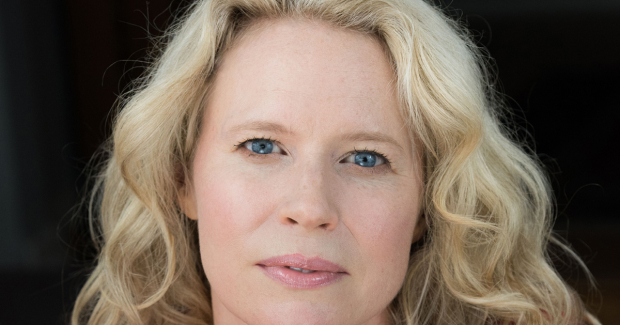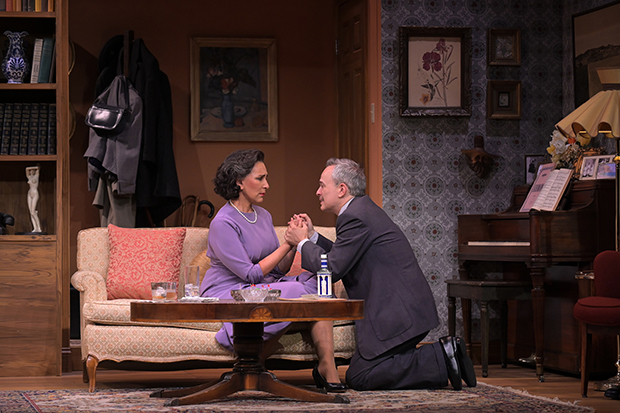Interview: Jessica Dickey Educates the Audience (and Herself) About the Pap Smear in Nan and the Lower Body
The actor and playwright’s new work is presented by TheatreWorks Silicon Valley in Palo Alto, California.
Jessica Dickey isn't sure how many times the word "vagina" is spoken in her latest play. She guesses the total is 152. Whatever the number is, it's high, because Nan and the Lower Body is a play about Pap smears. Or, more accurately, it's about people who helped to create the Pap smear. Inspired by Dickey's grandmother and the playwright's desire to learn about reproductive health, the drama imagines what might have taken place in the lab of Dr. Papanicolaou, the pioneering doctor in early cancer detection and creator of the procedure.
Commissioned by Manhattan Theatre Club and the Sloan Foundation, Nan and the Lower Body opened July 16 in a production of TheatreWorks Silicon Valley at the Lucie Stern Theatre in Palo Alto, California. The play explores long-standing issues around gender equality in the home and workplace as well as conflicts between science and faith. It honors progress but also paints a portrait of how little has changed.
Daring, imaginative works are nothing new to Dickey. The actor and playwright's writing has explored feminism and religion (The Convent) and school shootings (The Amish Project), and has often examined how the past influences the present. Dickey sat down with TheaterMania to discuss family history, hospital labs, and unexpectedly becoming part of the zeitgeist.

(© Todd Cerveris)
This interview has been condensed and edited for clarity.
The character of Nan was inspired by your grandmother. What inspired you to write a play about her and Dr. Papanicolaou?
The impulse was a very personal one because I grew up with my grandparents living with us, which was a very formative part of my childhood. My grandfather broke his hip early while living with us, and my grandmother had multiple sclerosis. My uncle, who has now passed, told me that he believed Nan worked with Dr. Papanicolaou, who created the Pap smear. I didn't really know a lot about her professional life. Despite how long of a tenure I had to ask those kinds of questions, I really didn't, and the failure to ask questions like that is part of the play.
It was a sort of stunning moment of realizing, despite being close with these people in my family, that I failed to really know them. In hindsight, the play was sort of built on the level of wondering, what if that was true? And then I imagined her in front of me as a full, hopeful, talented young person, ambitiously making her way into the world at a time when most women didn't have a job or any kind of career. She was making quite an interesting one at the cross section of when her own health situation was emerging.
In the meantime, I was struck with horror that I didn't really understand what the F a Pap smear was, which was horrifying, because I've been getting a Pap smear every year since I was 15. So there a double ignorance at play there. Apparently, I didn't know the things that I really should have tried to know about my grandmother, nor do I understand this very basic medical procedure that was pioneered by a very interesting and brave person. So I put those two things together.
Much of the play is set in Dr. Papanicolaou's lab. How did you prepare to write about his academic research, as well as stage the Pap smear that takes place in the play? Can you tell me a little bit about the scientific aspects of your research?
When I lived in New York, I had a wonderful gynecologist that I just adored. So I certainly had her to connect me with people. And then I spent the day at Sloan Kettering with a woman named Dr. Marcia Edelweiss. She sat with me in her office, talking me through the basics of the procedure of a Pap smear, walking me through and handing me over to the people in the cytopathology ward. They showed me some of the staining process.
When Dr. Marcia and I were sitting in her office, she had a microscope and she put a slide of a vaginal smear in the slides so that I could see what the cytologist would have been looking for. That was a stunning moment, because I realized how difficult that work is. I wanted the science to hold up in the play, and I felt that in the process of educating myself about the procedure, the play had an opportunity to offer that education to others.

(© Alessandra Mello)
You were in the cast of the 2012 Broadway production of Wit. Did your experience acting in a play about a woman living with ovarian cancer influence your writing Nan and the Lower Body?
Something that's kind of lucky about being a writer/actor is that when you have acted in so many plays, you're working with a fine-point pen in terms of what the medium can hold, what the actor can achieve, the journey the audience will go on. You have so many productions under your belt, you really can become quite hearty and courageous about the form because you've been a test driver for a lot of writing for a lot of audiences for a lot of years. In that sense, I'm sincere when I say I'm sure Wit is in there.
I think that [Wit] toggles between the science and, I would say, the academic rigor and the ticking clock of what a life can accomplish against the tidal pull of a disease. I guess there are elements of that in this play. But I wasn't conscious of that.
The play was first commissioned in 2016. Given the political turmoil of the past few years, especially with regards to reproductive justice, did your approach to the story change?
I don't think I was thinking that much about the politics at the time, probably because I knew I was riding an impulse I could really trust, which was a personal one that had to do with my grandmother. And I thought the rest [of the play] would speak for itself.
It is very interesting to realize that the play didn't come from a political impulse but has arrived at this moment when I feel that the heart space of the play is the right one or, at least, it's the most authentically mine to offer this moment.
Roe v. Wade was overturned while we were rehearsing this play, and, boy, was I very grateful that day to work on something that could lay its hand on this crisis in America. It's a political crisis, it's an identity crisis, it's a culture crisis, it's a civil rights crisis. Suddenly, this very personal play has arrived into the zeitgeist to meet a very political moment. And I know that the play takes good care of the audience, whatever the audience is carrying around these recent events, in their own questions or their own past.
The characters say the word "vagina" frequently throughout the play, and "vagina" also features prominently in the stage directions. What was your motivation to use the word so much?
I think I was conscious that it was very fun to make the audience sit with the word vagina and the subject of vagina, but also to take joy in piercing the call of their ignorance, which was my own call of ignorance. In terms of 'What is this thing called the Pap smear?' I was shocked to realize how little I knew.









